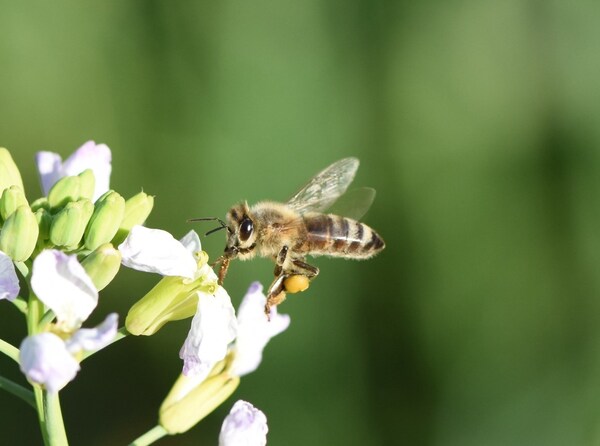A recent study by researchers from China, the UK and the Netherlands indicates habitat loss may impact the diversity of bees more than increased pesticide exposure.
SUZHOU, China, July 8, 2024 /PRNewswire/ -- Worldwide, hedgerows and wild grass in field margins which previously served as semi-natural habitats are being swallowed up into agricultural production. While scientists have suggested both pesticide use and habitat loss are detrimental to pollinators, their relative impacts have been unclear.

Researchers studied honeybees (Apis mellifera) and a mason bee (Osmia excavata) across 20 rice fields within the Yangtze River Valley in China to understand the loss of habitat and pesticide exposure Credit: Changsheng Ma
A recent study published in the Journal of Applied Ecology offers insight. Its findings indicate semi-natural habitats play a more important role than pesticide use in rice fields, in efforts to stem the decline in pollinator diversity.
The researchers studied honeybees (Apis mellifera) and a mason bee (Osmia excavata) across 20 rice fields within the Yangtze River Valley in China.
Dr Yi Zou, an associate professor at Xi'an Jiaotong-Liverpool University (XJTLU), China, who co-led the team, says: "Non-crop habitats are important for pollinators in agricultural fields as these provide essential resources and nesting sites.
"Although the impact of pesticides cannot be ignored in efforts to reduce the decline in pollinator diversity, our results suggest it would be better to concentrate on conservation of semi-natural habitat than on reduction of pesticide use in rice fields."
One of the resources these habitats provide is food, says Dr XiaoYu Shi, the study's first author and a postdoctoral researcher at the Chinese Academy of Sciences, China.
Dr Zou says: "Pollinator diversity in Chinese small-holder agricultural ecosystems is very high, likely due to the diverse and complex landscape. Therefore, conserving semi-natural habitats in these agricultural systems is crucial.
"However, the impact of pesticides is still an important consideration. We found honey bees have a higher pesticide exposure risk in more intensified rice field," Dr Zou says.
"Many aspects remain poorly understood. We need long-term monitoring of pollinator populations and their exposure to pesticides to better inform conservation efforts."
The study, "Influence of agricultural intensification on pollinator pesticide exposure, food acquisition and diversity", can be read here.
source: Xi'an Jiaotong-Liverpool University
【你點睇?】恒指在2024年先跌後升,你點睇2025年港股走勢?► 立即投票































